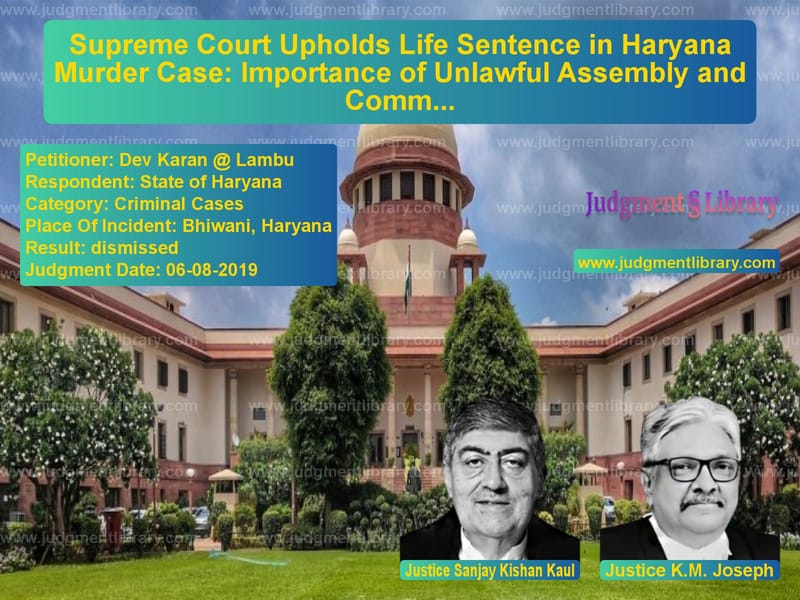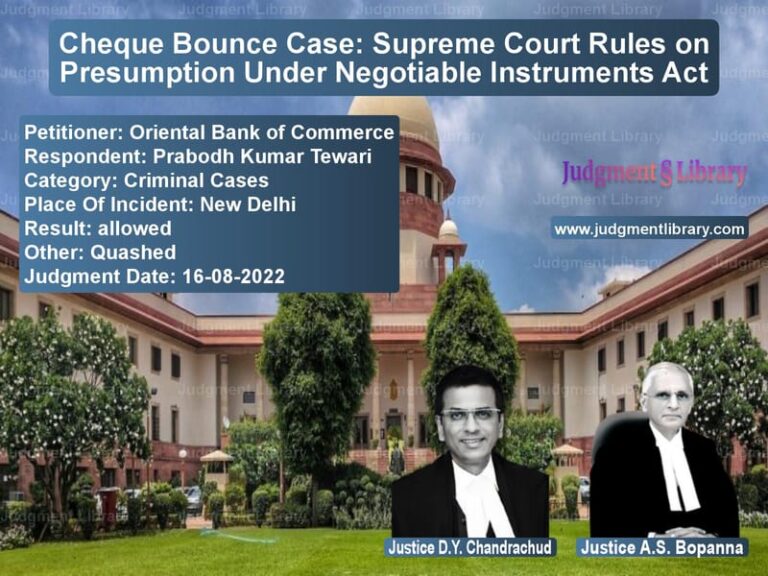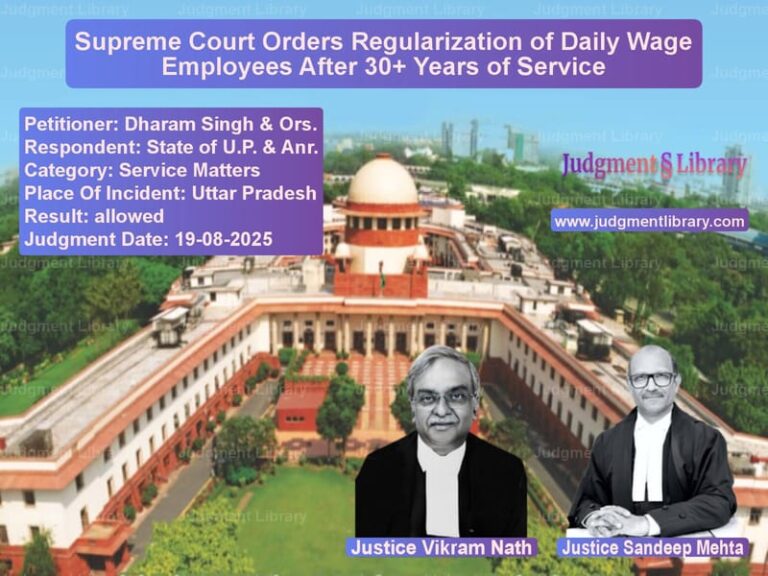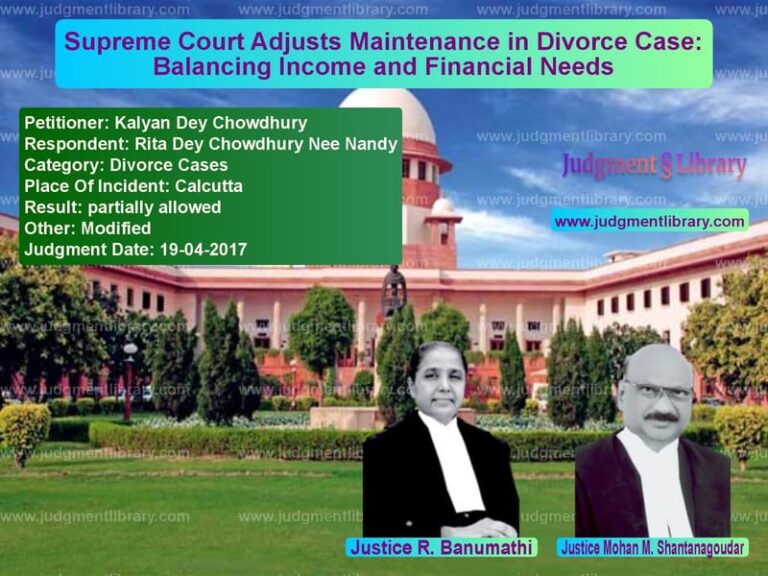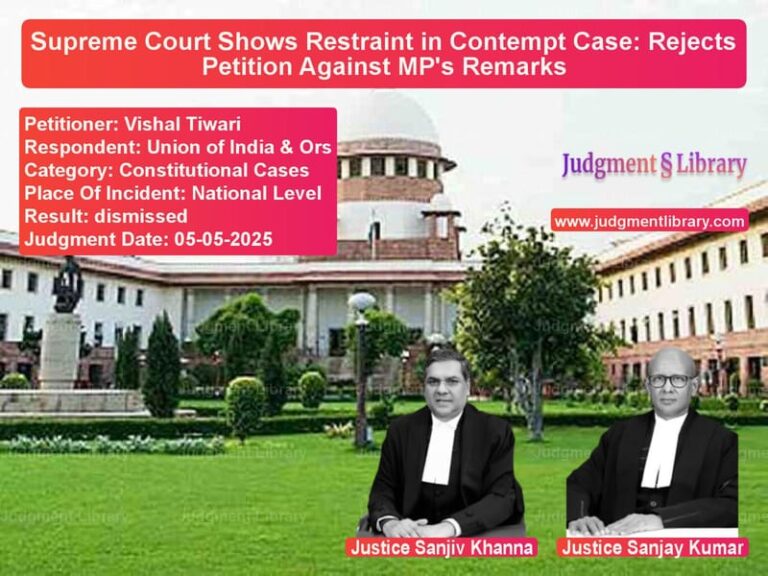Supreme Court Upholds Life Sentence in Haryana Murder Case: Importance of Unlawful Assembly and Common Object
The Supreme Court of India, in its judgment dated August 6, 2019, in the case of Dev Karan @ Lambu v. State of Haryana, examined the principles of unlawful assembly, common object, and vicarious liability under Section 149 of the Indian Penal Code (IPC). The Court upheld the conviction of multiple accused for the murder of Jaibir @ Gabbu and reaffirmed the importance of circumstantial evidence in establishing criminal liability.
Background of the Case
On the night of July 28, 1994, at around 3 AM, Jaibir @ Gabbu was brutally attacked and murdered in his under-construction house in Bhiwani, Haryana. The FIR was lodged by Surender (PW-7), who was present at the scene. Prior to the murder, the deceased and his friends, including Surender (PW-7), Ajay Bhan (PW-8), Narender, and Sandeep, were consuming liquor at the under-construction site.
During the drinking session, an altercation took place between Sandeep and two accused, Krishan and Vidhya Rattan, near a liquor shop. The deceased intervened and asked them to discuss the matter the next day. Shortly afterward, seven accused, armed with deadly weapons like wooden rafters (bahi), lathis, and a sword, barged into the under-construction house and attacked the deceased indiscriminately. Jaibir sustained multiple injuries, including fatal head wounds. PW-7 and PW-8 were also injured while trying to intervene.
The accused fled the scene after the assault, leaving the deceased critically wounded. He was taken to the General Hospital in Bhiwani, but succumbed to his injuries.
Trial Court Verdict
The accused were arrested, and their weapons were recovered. The trial court found them guilty under Sections 148, 302, 307, 325 read with Section 149, and Section 449 of the IPC. They were sentenced to life imprisonment and fined Rs. 500 each under Section 302 IPC, with additional imprisonment under other sections.
High Court Appeal
The convicts appealed before the Punjab and Haryana High Court, which upheld the trial court’s verdict on September 19, 2008. Dissatisfied, four of the accused (A-3, A-4, A-5, and A-6) filed appeals before the Supreme Court.
Petitioner’s Arguments
The defense presented the following arguments:
- Unlawful Assembly Not Proven: The accused contended that the prosecution failed to establish a common object under Section 141 IPC.
- Inconsistencies in Testimonies: The statements of PW-7 and PW-8 had discrepancies regarding who inflicted which injury.
- Failure to Examine Key Witnesses: Sandeep and Narender, who were present at the initial altercation, were not examined.
- Mistaken Identity: Accused No. 5 (Suresh) argued that he was mistakenly identified as ‘Lala’ in the FIR.
- Mitigating Circumstances: The defense requested a reduction of the sentence to Section 304 Part II IPC, arguing that the accused had already served over nine years.
Respondent’s Arguments
The prosecution countered:
- Clear Evidence of Unlawful Assembly: All accused arrived at the scene together, armed with weapons, and attacked in unison.
- Testimonies Corroborated Each Other: Minor discrepancies did not affect the core truth of the prosecution’s case.
- Independent Witnesses Identified the Accused: Injured witnesses PW-7 and PW-8, who knew the accused personally, gave consistent accounts.
- Forensic Evidence Supported Prosecution: The post-mortem confirmed multiple blunt force injuries inflicted by different weapons.
Supreme Court’s Observations
The Supreme Court, led by Justices Sanjay Kishan Kaul and K.M. Joseph, analyzed the arguments and upheld the convictions, making the following key observations:
1. Unlawful Assembly and Common Object
The Court reiterated that once an unlawful assembly is established, every member is vicariously liable for the crime committed in pursuance of the common object:
“Section 149 IPC imposes vicarious liability on members of an unlawful assembly even if they did not inflict fatal injuries, provided they shared the common object.”
2. Minor Discrepancies in Testimonies Do Not Invalidate Prosecution Case
The Court dismissed the argument that slight inconsistencies in witness statements affected their credibility:
“In an incident where multiple accused attacked simultaneously, some variation in testimony is natural and does not render the prosecution’s case doubtful.”
3. Non-Examination of Certain Witnesses Does Not Weaken the Case
The Court held that the absence of testimony from Sandeep and Narender did not prejudice the case, as the key prosecution witnesses had already established the facts.
4. No Justification for Reducing Sentence
The Supreme Court rejected the plea to reduce the life sentence under Section 304 Part II IPC:
“The nature and manner of the assault, the choice of weapons, and the number of injuries indicate a premeditated act with a clear intent to kill.”
Final Verdict
The Supreme Court dismissed the appeals, upholding the life imprisonment sentence of the accused, ruling:
- The prosecution had successfully proven the existence of an unlawful assembly.
- The conviction under Section 149 IPC was justified.
- There was no reason to reduce the sentence given the brutality of the attack.
Impact of the Judgment
This ruling has significant implications:
- Strengthening the Law on Unlawful Assembly: The judgment clarifies that all members of an unlawful assembly can be held equally responsible.
- Protecting Witness Credibility: The ruling confirms that minor contradictions do not automatically discredit witness testimonies.
- Reinforcing Life Sentences for Brutal Murders: The verdict sends a strong message that leniency will not be shown in cases of violent mob attacks.
Conclusion
The Supreme Court’s decision in Dev Karan @ Lambu v. State of Haryana serves as a precedent for cases involving unlawful assemblies and collective violence. By upholding the life sentences, the Court reaffirmed the principles of vicarious liability, ensuring that justice is served for victims of mob violence.
Petitioner Name: Dev Karan @ Lambu.Respondent Name: State of Haryana.Judgment By: Justice Sanjay Kishan Kaul, Justice K.M. Joseph.Place Of Incident: Bhiwani, Haryana.Judgment Date: 06-08-2019.
Don’t miss out on the full details! Download the complete judgment in PDF format below and gain valuable insights instantly!
Download Judgment: Dev Karan @ Lambu vs State of Haryana Supreme Court of India Judgment Dated 06-08-2019.pdf
Direct Downlaod Judgment: Direct downlaod this Judgment
See all petitions in Murder Cases
See all petitions in Bail and Anticipatory Bail
See all petitions in Attempt to Murder Cases
See all petitions in Judgment by Sanjay Kishan Kaul
See all petitions in Judgment by K.M. Joseph
See all petitions in dismissed
See all petitions in supreme court of India judgments August 2019
See all petitions in 2019 judgments
See all posts in Criminal Cases Category
See all allowed petitions in Criminal Cases Category
See all Dismissed petitions in Criminal Cases Category
See all partially allowed petitions in Criminal Cases Category

